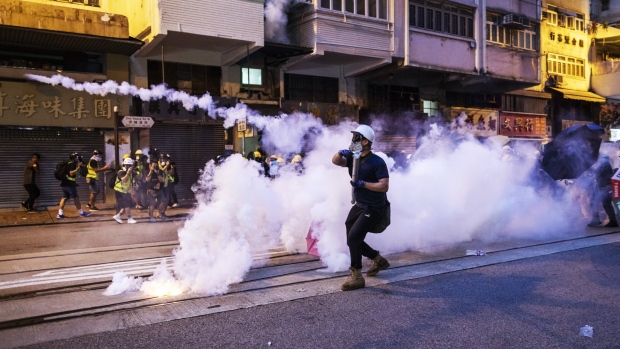Sep 29, 2019
Why this year’s National Day means so much to China
, Bloomberg News
Hong Kong Clashes Intensify
China’s National Day -- the anniversary of the founding of the People’s Republic of China -- is usually marked with speeches, flags, fireworks and the like. This Oct. 1 holiday will see “mass pageantry,” including a military parade, as 2019 carries particular significance for President Xi Jinping, marking 70 years of Communist Party rule. That’s one year longer than the Soviet Union lasted. It also is freighted with a series of potential challenges, from rising prices and a slowing economy on the mainland to pro-democracy protests in Hong Kong and a more confrontational U.S. government.
1. What’s the history?
Mao Zedong, the Communist Party’s then leader, declared the creation of the People’s Republic of China on Oct. 1, 1949, after four years of civil war with the Nationalist Party, or Kuomintang, following the end of Japanese occupation during World War II. The two sides had been fighting on and off for decades to fill a power vacuum left by the Chinese Revolution of 1911, which brought an end to the Qing dynasty. The “fall” of mainland China to communism in 1949 led the U.S. to suspend diplomatic ties with Beijing for decades. The KMT and 1.5 million refugees fled to the island of Taiwan, where they set up a rival government.
2. How is it celebrated?
Beijing will be the center of the action. Xi and other party leaders visited Mao’s remains for a ceremony Monday. Some 30,000 onlookers are expected to turn out for an 80-minute military parade featuring new, advanced hardware, a reflection of Xi’s drive to modernize the armed forces to rival those of the U.S. Xi is also set to attend a “grand evening gala” in Tiananmen Square, where party and state leaders and members of the public will watch unspecified performances and a fireworks display. At least 100,000 people will take part in “mass pageantry,” with some 60,000 attending the evening gala, according to Chinese state media.
3. Any special safety precautions?
Security was especially tight in Hong Kong, where authorities canceled the annual waterfront fireworks, citing safety concerns amid ongoing bouts of civil unrest in the city. Police refused a permit for a major pro-democracy march, but multiple rallies were planned elsewhere. Hong Kong’s Chief Executive Carrie Lam flew to Beijing for the celebrations there, and planned to return Tuesday evening via the border city of Shenzhen -- avoiding Hong Kong airport. Security was tightened in Beijing as well: Things that could impact flight safety - including pigeons, balloons, lanterns, kites and drones -- have reportedly been banned. A prominent editor at Chinese state media complained publicly that accessing internet sites outside the country was getting tougher ahead of the holiday. The post was soon deleted.

4. Why is this year so important to Xi?
At 70, China’s Communist Party becomes the second-longest ruling party in history, about a year behind its neighbor, North Korea. But in January, Xi summoned ministers and provincial chiefs to Beijing to warn that “major risks” abound and their “long-term rule” wasn’t guaranteed. The speech came the same day China reported its slowest annual economic growth since 1990, in the wake of the Tiananmen Square crackdown (the 30th anniversary of that event this year went unmarked). At another big anniversary in May, the centenary of a student-led uprising, Xi stressed the party’s legitimacy and central role in building China into a budding superpower.
5. What risks worry Xi?
They include the trade war started by U.S. President Donald Trump and other U.S. moves -- such as sanctions imposed on Huawei Technologies Co. -- that China sees as intended to stymie its growth and technological progress. Chinese Vice Premier Liu He, U.S. Trade Representative Robert Lighthizer and Treasury Secretary Steven Mnuchin are scheduled to meet days after the celebrations, as the tensions take a toll on both their economies. At the same time, Hong Kong’s months-long protests against China’s increasing influence have rocked the city and begun to threaten its all-important special trading status with the U.S. They also have boosted pro-independence sentiment in Taiwan. There are other issues too: the rising cost of food, toxic air pollution and a struggle to reduce China’s massive debt.


